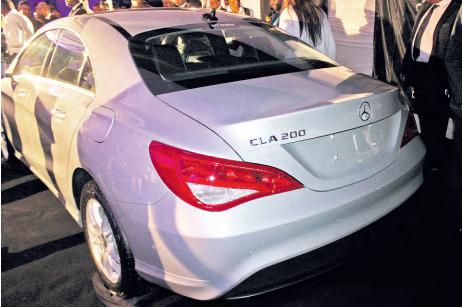
 A new Mercedes-Benz car at a showroom in Westland, Nairobi /FILE
A new Mercedes-Benz car at a showroom in Westland, Nairobi /FILE
Improved credit access following interest rates cut, a stable shilling and continued government purchases have helped stabilise the new car market in the country with February sales picking.
Latest Kenya Motor Industry Association (KMIA) data shows monthon-month sales went up 7.9 per cent during the month as dealers sold a total of 1,088 units both in the local market and exports to the region mainly Uganda, up from 1,008 in January–80 units more.
Cumulative January and February were 2,096 units, as the industry picks from a slow year in 2024 where high taxes, costly credit and reduced uptake of units by the government depressed sales.
Trucks (463 units), pick-ups (211) and buses (206) were the most sold vehicles in February, an indication of sustained economic activities in the transport sector, construction, retail, manufacturing and agriculture sectors.
Isuzu East Africa (former general motors) retained its market lead with 527 units up from 495 vehicles in January.CFAO came in second with 344 units up from 284 units, with the two dominating the market as Simba Corporation (former Simba Colt Motors) coming a distance third with 101 units sold during the month, which was a drop compared to 140 units sold in January.
“We see construction beginning to pick and demand for raw materials such as sand cement and general construction materials beginning to pick and this could hold as we start 2025,” Isuzu East Africa managing director Rita Kavashe told the Star.
These are sectors that mainly drive the purchases in trucks and prime movers.
“Interest rates went up 20 per cent making it difficult for some customer to buy new product,” said Kavashe.
Last year, dealers sold a total of 11,352 units including exports to regional markets, with those sold in the local market closing the year at 11,059.
The overall industry sales were down from 11,370 units sold in 2023 and the 13, 352 new vehicles (zero mileage) sold in 2022, as second-hand imports remained the most preferred mainly on their affordability compared to new ones.
Kavashe pegged last year’s performance on high interest rates, which hit 20 per cent, reduced uptake of new units by government and pending bills owed to the private sector, which slowed down investment by firms.
“This cash flow challenge made some delay in execution of works thus affecting procurement of new project vehicles,” she said.
The month-on-month increase comes on the back of increased asset financing activities by banks, amid a reduction in interest rates following Central Bank of Kenya’s reduction of the base lending rate to 10.75 per cent on February 5 from 11.25, to boost private sector credit.
This has helped lower the cost of credit with the private sector going for credit for key projects in manufacturing, real estate, transport industry among other sectors.
A sizable percentage of new vehicle sales, mainly for companies and individuals, are financed under asset plans by the different banks.
Saccos-focused lender-Co-operative Bank for instance disbursed new vehicle financing worth Sh6.6 billion last year, with the repayment period increased from 60 to 72 months under a deal with Isuzu.
The interest rate reduced from 20.5 per cent to 18.5 per cent.
Overall, Kenyans continue to prefer second-hand imports which come with a lower price despite heavy taxation, with some units asking price going as low as Sh800,000 compared to new cars whose starting price average above Sh2.5 million.
According to the Car Importers Association of Kenya, locally assembled units are expensive by more than Sh600,000 on average.










